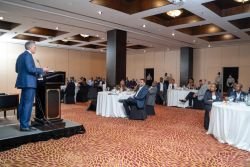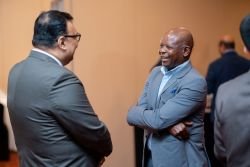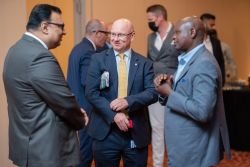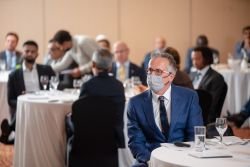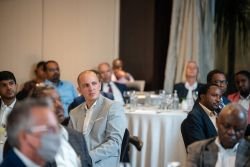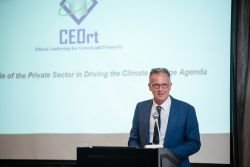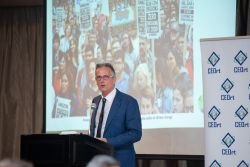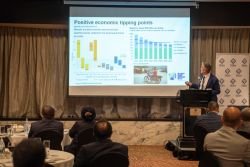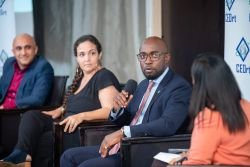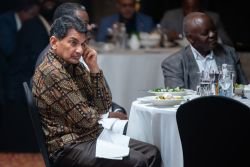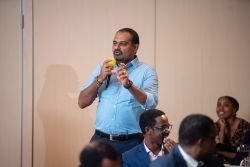Engagement Summary
[su_expand more_text=”Read more” height=”100″ text_color=”#777″ link_color=”#24478D” link_style=”dashed” more_icon=”icon: angle-down” less_icon=”icon: angle-up”]The scientific evidence on climate tipping points has become too risky to ignore as the growing threat of catastrophic climate-related events that affect geographies and communities on a global scale is ever on the rise. Climate change and extreme weather occurrences i.e.: floods, fires, and tropical storms, for example, have a direct impact on the world’s economic sectors. For businesses specifically, a warming planet creates a wide range of risks, from labour challenges, supply chain disruptions to rising insurance costs, and hence requires a forceful shift in the mindsets and actions of organizations in how business as usual is conducted.Through its Business and Sustainability pillar, the CEOrt supports initiatives that align with environmental sustainability. For several years, members of the CEOrt have recognized the importance of adopting business practices that have a positive impact on the environment and society. Furthermore, Private Sector leaders are aware that they are being held more accountable to ensure that they play their part in securing a nature positive future within the communities on which they depend upon, by actioning initiatives that accelerate decarbonization and invest in sustainable solutions as per Sustainable Development Goal 13, which calls for urgent climate action.
In Tanzania, businesses in all sectors are being impacted by the climate crisis either directly or indirectly, and therefore presents a collective economic challenge that requires immediate action from local leaders and members of the international community. Aligned to the Government’s goal to achieve 30-40 % carbon reduction by 2030, the CEOrt as the core representative body of the private sector has taken the initiative to challenge its members to take the lead in driving immediate, intentional, and responsible climate action.
To kick start the conversation, members of the business and diplomatic community converged at the Hyatt Regency Hotel on 21st September 2021, to explore ‘The Role of the Private Sector in Driving the Climate Change Agenda” in Tanzania. Facilitated through a keynote speech delivered by H.E David Concar, British High Commissioner to Tanzania, the session put hammer to nail by emphasizing the immediate need for leaders to respond to climate change as “the scientific evidence on climate tipping points has become too risky to bet against if the future of business is to remain secure”. Although H.E. Concar delivered his keynote with an undeniable tone of urgency and gravity, his message did offer signals of hope as he also highlighted the many opportunities that these necessary environmental adjustments can present for the companies and the economy as “low-carbon transitions can create opportunities for efficiency, innovation, and business growth”.
Providing the opportunity to expand on insights and perspectives presented by H.E. Concur, a panel of experts in the business and sustainability arena presented on current efforts that are currently being implemented by members of the private sector to respond to the climate crisis. Sharing his experience with adopting climate change locally in Tanzania, Devang Vussonji – Partner at Dalberg Tanzania further elaborated on the lingering question that was raised by many in the room; “how do businesses respond to climate change?”. As a strong advocate of collaborative action, Vussonji advises executives to revise their strategies to ensure that they map out and enhance their understanding of how to operate in this new climate conscious competitive environment by identifying which “green businesses are going to disrupt the status quo” and then determine how to “tap into and leverage on the presented opportunities”.
In line with this Ana Le Rocha, Executive Director at Nipe Fagio added to the conversation by encouraging executives to refrain from responding to the climate crisis by partaking in CSR-based initiatives as they looked for green business opportunities. “CSR simply does not work” Le Rocha echoed, a statement that resonated profoundly with all present on the evening and forced many to reimagine what constitutes impactful climate action for a certain green future.
Bringing the conversation home by providing solutions to how companies can engine their climate action agendas, Jerry Agyeman-Boateng shared insights on the role of green finance in supporting the actualization of green projects by sharing Standard Chartered’s success story of supporting the development of the Standard Gauge Railway project which once completed will support the Government in attaining its 2030 carbon reduction target by reducing motor vehicle traffic on Tanzanian motorways.
Challenging business leaders to take the lead, be loud and bold the CEOrt remains committed to championing climate action and urges members of the private sector to change the rules of the game and transform how business as usual is conducted to prioritize environmental impacts and secure a cleaner and resilient future for all Tanzanians. The time to act is now.
#Business&Sustainability #CEOrtMonthlyMeeting #CEOrtClimateAction #UrgentClimateAction
[/su_expand]



